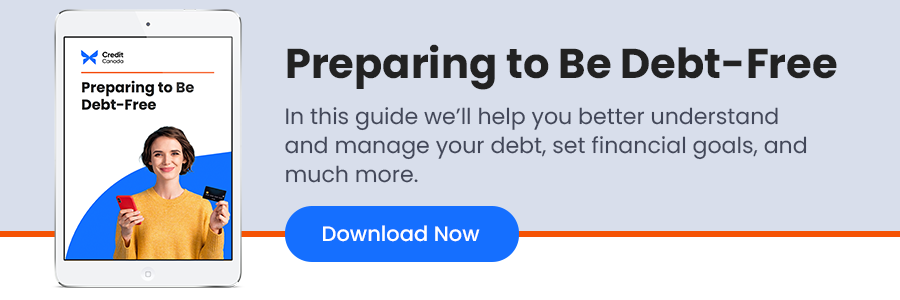
What Is the “Right of Offset” & How It Relates to Debt
There are a lot of terms used by financial institutions that the average person would be completely unfamiliar with until they’ve run afoul of some obscure clause in their financial services agreement that has it. One such term is the “Right of Offset.”
What is the right of offset? How does it affect those with debt from a bank or other financial institution? More importantly, what can you do to avoid running afoul of a lender’s right to take the money you owe them right out of your bank account?
Can the Bank Take Money from My Account?
The short answer is “Yes. In certain circumstances, the bank can take money from your account.”
If you have a loan, line of credit, credit card, or other debt from a financial service with a bank where you have a chequing or savings account, the bank has the right to reclaim that money from your account if you default on that debt.
What’s really distressing for many is that the right of offset in Canada allows the bank to do this without:
-
Giving you advance warning
-
Asking your permission
-
Leaving you with any money in your account if you owe more than you have in the account
In fact, if your account doesn’t have enough to cover your debt, your bank may be able to charge a non-sufficient funds (NSF) fee—potentially adding to your debt. They can literally take your last dollar without telling you and charge a fee if you go negative on your bank balance because of it.
However, this only applies if you have a bank account with that lender. If you don’t have an account with your creditor, then they will have to go through other channels to recover funds from you—such as seeking wage garnishments after getting a court order.
Going through the court system is slower, less reliable, and more expensive. So, many lenders may choose to work with you on your debt repayment methods rather than risk taking you to court (which can happen). For example, the bank may agree to negotiate a debt consolidation program with you and your credit counsellor, so they can recover at least a portion of what they’re owed.
What Is the Right of Offset?
To paraphrase the Government of Canada website, the right of offset is a right that allows financial institutions to recover money owed to them by their depositors on outstanding debts. However, it needs to be included as a clause in a financial institution’s agreements to be enforceable.
Here’s an example of how the right of offset can work: Say you’re defaulting on a loan you have with your bank that isn’t secured with some form of collateral that the bank could take. They could pull the money you owe out of the bank accounts you have with them to make up for the loss.
One day, you check your bank balance to see that your account is missing a lot of money and you don’t know why. When you check the transaction history, you see a charge for payment to a loan or credit card account you had with that bank. And, sure enough, when you check your debt with that card/loan, you find that the debt has been paid off with the money taken from your account.
Tips for Avoiding “Right of Offset” Withdrawals
So, what can you do to avoid the right of offset from credit card debt or other forms of debt held by your bank? Some things you can do include:
- Negotiating with Your Lender. If you know you have a loan or other debt that is outstanding with your bank, reach out to them and try to work out a payment plan or other debt repayment solution with them. Many lenders may respond favorably to proactive communication and work with you to get your debt paid off without invoking their right of offset.
- Not Getting Loans/Credit Cards with Your Bank. The right of offset can only be applied if the lender is the same organization that you have a bank account with. If you don’t have a loan or other form of debt with your bank, then your bank cannot simply take the money owed out of your account. However, some financial institutions may offer incentives to get you to take out loans and credit cards with them that reduce the risk of encountering right of offset. Now, if a lender owes a debt to you and you owe a debt to them somehow (even if they aren’t a bank and you don’t have a savings/chequing account with them), then that lender could potentially apply the right of offset to reduce or clear the debt they owe you.
- Don’t Get a Joint Account with Someone in Debt to Their Bank. If you’re a part of a joint account with someone who is in debt to that bank, then the lender could take the money they’re owed out of that account.
- Investigate Insolvency Options with a Licensed Insolvency Trustee. If you’re drowning in debt and have no realistic means of repaying it—and can’t get your bank to agree to a deferred payment plan, debt consolidation loan, or other means of debt relief—you may want to consider talking with a licensed insolvency trustee (LIT) like The Oakman Group about a consumer proposal or filing for bankruptcy. Filing consumer proposals or bankruptcy procedures will put an immediate stop to collection activities. However, insolvency may mean forfeiting assets to cover your debts—though there are limits on the assets that the trustee will be required to sell.
- Check Loan/Credit Card Agreements for Right of Offset Clauses. Before signing a loan or credit card agreement, check the paperwork for lines saying things like: “If the borrower defaults on payment, they agree to allow money to be taken directly out of their account with [Bank’s Name] to cover the debt under this agreement.” The precise wording will vary from bank to bank, but should convey that they will have a right under the contract to take money from your other accounts with them. If you’re particularly worried about a lender applying the right of offset without warning, then you may not want to sign for a loan, credit card, or line of credit with them if their contract has such clauses.
- Pay Down Your Debt When You Can. Making consistent payments on your debts with your lender is a good way to avoid them invoking their right of offset clause in their contract. As long as you’re making consistent timely payments, it is unlikely that they will try to automatically take money from your account. If you hold multiple debts, consider following a specific repayment strategy, such as the snowball or avalanche methods of paying off debt. With snowball methods, you focus on paying off your smallest debts first to get rid of them and put the money that would have gone to those payments to the next-highest debt. With avalanche methods, you put the most money towards your biggest or highest-interest debts first and, once they’re paid off, start putting the money for those to the next-highest debt. Snowball methods make it easier to stay motivated while avalanche methods help you minimize the total amount of money you spend on interest (since you’re eliminating the highest-interest accounts first).
Get Debt Help Now!
Need help with debt management? Don’t worry, everyone can use a little assistance from time to time—especially when it comes to complicated topics like personal finance. There’s no shame in looking for help from someone with experience in dealing with creditors.
However, it’s important to look for help that’s reliable. There are a lot of predatory businesses that try to take advantage of consumers to rip them off while promising to clear their debt. Remember: if a solution sounds too good to be true, it’s probably a trap. For example, you should beware of debt settlement services that use high-pressure sales tactics, charge up-front fees, and have hard-to-read contracts with copious amounts of legal double-speak.
Getting out of debt isn’t easy and there is no such thing as a guarantee that a bank or other lender will agree to settle a debt for a fraction of its total. While debt consolidation programs (DCPs) can help you reduce the total amount you pay and stop collection activities, it’s up to your creditors to agree to enter the agreement. Though many creditors do enter DCPs to avoid the risk of debtors filing for insolvency, there’s no guarantee they’ll agree.
If you are in debt and need help, reach out to Credit Canada for free debt counselling. Our certified Credit Counsellors can provide personalized support to help you get out of debt so you can get back into life!
Frequently Asked Questions
Have questions? We are here to help
A Debt Consolidation Program (DCP) is an arrangement made between your creditors and a non-profit credit counselling agency. Working with a reputable, non-profit credit counselling agency means a certified Credit Counsellor will negotiate with your creditors on your behalf to drop the interest on your unsecured debts, while also rounding up all your unsecured debts into a single, lower monthly payment. In Canada’s provinces, such as Ontario, these debt payment programs lead to faster debt relief!
Yes, you can sign up for a DCP even if you have bad credit. Your credit score will not impact your ability to get debt help through a DCP. Bad credit can, however, impact your ability to get a debt consolidation loan.
Most people entering a DCP already have a low credit score. While a DCP could lower your credit score at first, in the long run, if you keep up with the program and make your monthly payments on time as agreed, your credit score will eventually improve.
Anyone who signs up for a DCP must sign an agreement; however, it's completely voluntary and any time a client wants to leave the Program they can. Once a client has left the Program, they will have to deal with their creditors and collectors directly, and if their Counsellor negotiated interest relief and lower monthly payments, in most cases, these would no longer be an option for the client.



